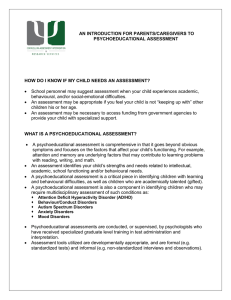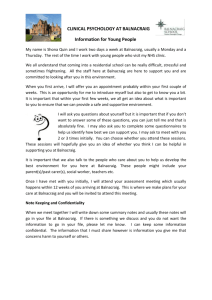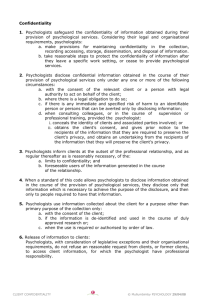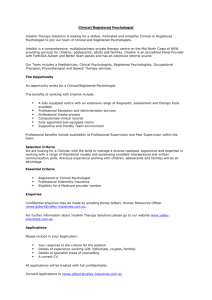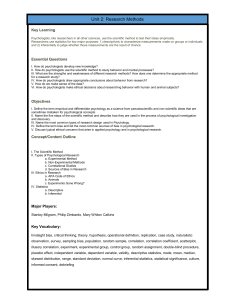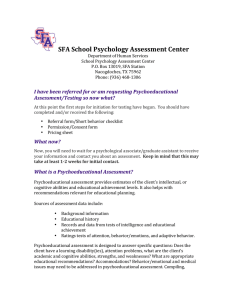School Psychologists - Edmonds School District
advertisement
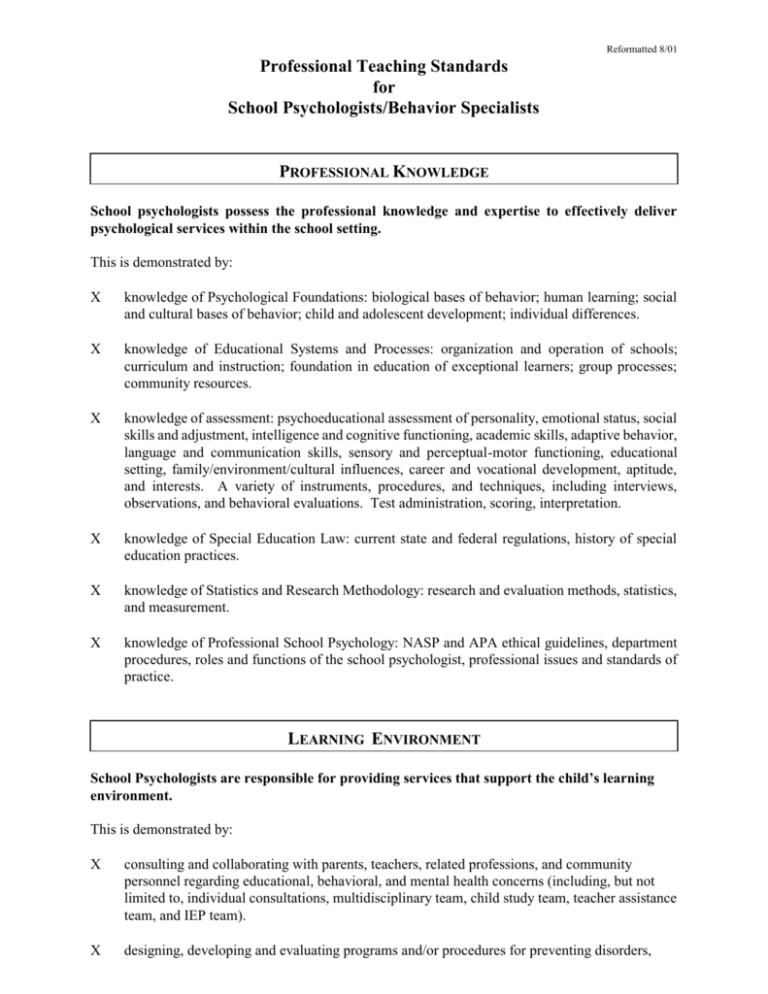
Reformatted 8/01 Professional Teaching Standards for School Psychologists/Behavior Specialists PROFESSIONAL KNOWLEDGE School psychologists possess the professional knowledge and expertise to effectively deliver psychological services within the school setting. This is demonstrated by: knowledge of Psychological Foundations: biological bases of behavior; human learning; social and cultural bases of behavior; child and adolescent development; individual differences. knowledge of Educational Systems and Processes: organization and operation of schools; curriculum and instruction; foundation in education of exceptional learners; group processes; community resources. knowledge of assessment: psychoeducational assessment of personality, emotional status, social skills and adjustment, intelligence and cognitive functioning, academic skills, adaptive behavior, language and communication skills, sensory and perceptual-motor functioning, educational setting, family/environment/cultural influences, career and vocational development, aptitude, and interests. A variety of instruments, procedures, and techniques, including interviews, observations, and behavioral evaluations. Test administration, scoring, interpretation. knowledge of Special Education Law: current state and federal regulations, history of special education practices. knowledge of Statistics and Research Methodology: research and evaluation methods, statistics, and measurement. knowledge of Professional School Psychology: NASP and APA ethical guidelines, department procedures, roles and functions of the school psychologist, professional issues and standards of practice. LEARNING ENVIRONMENT School Psychologists are responsible for providing services that support the child’s learning environment. This is demonstrated by: consulting and collaborating with parents, teachers, related professions, and community personnel regarding educational, behavioral, and mental health concerns (including, but not limited to, individual consultations, multidisciplinary team, child study team, teacher assistance team, and IEP team). designing, developing and evaluating programs and/or procedures for preventing disorders, School Psychologist Standards - Page 2 intervening to promote mental health and learning, and improving educational systems. working collaboratively on a multidisciplinary team to develop individualized educational and behavior support plans. providing skill enhancement activities regarding issues of human learning, development, and behavior (such as parent education, student and parent counseling, and inservice training). describing school psychological services and clearly communicating an access and referral system for staff, parents, and other professionals. creating a safe environment for student and parent counseling (while maintaining confidentiality) in such areas as referrals to outside agencies, developing interventions, problem solving, assessment feedback, and educational planning. ASSESSMENT/REFLECTIVE PRACTICES School psychologists are responsible for assessing the psychoeducational functioning of children and developing and practicing reflective strategies. This is demonstrated by: conducting multifactored psychoeducational assessments, utilizing a variety of instruments, procedures, and techniques. taking into account cultural, contextual, and setting influences when conducting psychoeducational assessments. communicating interpretations of assessment results, in oral and written form, to parents, students, and related professionals in a manner that is respectful, accurate, understandable, and useful. integrating their knowledge of curriculum, instruction, the child’s needs, assessment results, and the resources available to provide practical recommendations to those who work directly with the child. conducting psychoeducational assessments and completing required documentation in compliance with state, federal, and district regulations in a timely and organized fashion. FAMILY AND COMMUNITY INVOLVEMENT School psychologists foster connections between schools, families, and the community. This is demonstrated by: maintaining relationships and collaborating with other professionals in the community who 116104070 (sj) School Psychologist Standards - Page 3 provide services to children and families. demonstrating respect for the parents’ role by involving them in decision making, educational planning, and advocacy for their child. using effective communication skills, taking into account diversity in families’ culture, environment, and language. communicating with parents in an environment which protects student and family rights to privacy in compliance with ethical and legal guidelines. referring families to community agencies and providing follow-up support as needed. PROFESSIONAL COMMITMENT AND INVOLVEMENT School psychologists are committed to their profession. This is demonstrated by: actively participating in activities designed to continue, enhance, and upgrade professional training and skills to help ensure quality service. This includes, but is not limited to, membership in professional organizations, reading of professional journals and books, discussion of professional issues with colleagues, and participation on special committees. being aware of their professional and personal limitations and strengths in carrying out professional activities. practicing in full accordance with ethical guidelines as published by professional organizations. becoming integrated members of their assigned schools and department as evidenced by participation in school and department activities and decision making. building and fostering positive relationships with colleagues. 116104070 (sj)
